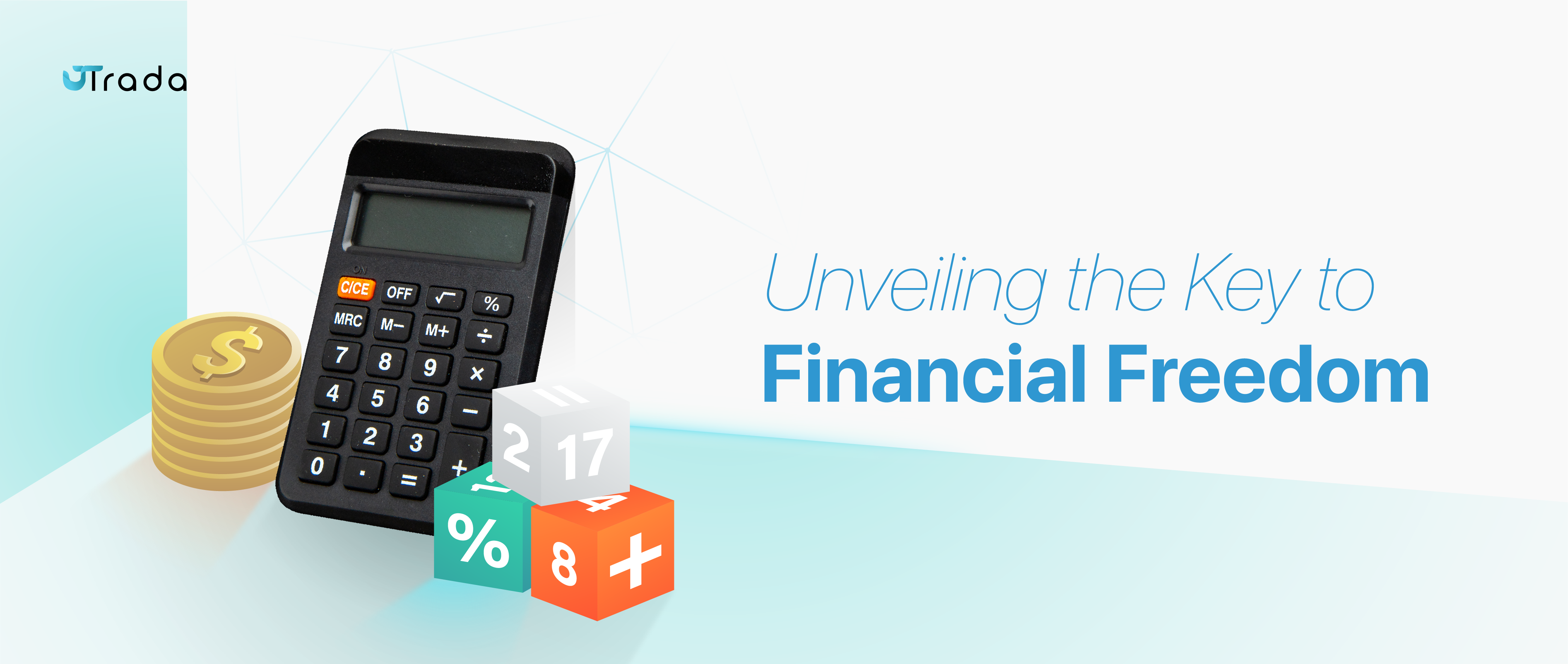Universal greed for financial independence sounds like a proper cliche—a general concept that exceeds all the cultural, geographical and socio-economic borders. It expresses a wish to achieve independence from financial constraints, giving a person an opportunity to escape from commonly seen worries about financial matters and continue the way he/she wants. The truth is that there is not a single answer to this question, and the process of achieving freedom financially varies considerably depending on individual circumstances.
Basically, financial autonomy is not needed to have the preferred living standard regularly or depends on the salary from jobs. It implies a state of financial power, wherein people can be able to decide on their choices regarding themselves or those they can indulge in rather than their choices regarding financial necessities.
Table of Contents
ToggleThe Definitions of Financial Freedom

Financial freedom is the situation of a person or a family who has enough financial capabilities to live a simple lifestyle without depending on their income from their jobs or salaries. It incorporates possessing a sufficient passive revenue base of investments, renting properties or royalties that cover all expenses, and providing for the perfect kind of living without the constraint of actively working for money.
Financial freedom is more than having a large amount of money; it is also about utilizing your finances effectively to be able to keep it for a long time and even share it with others. This is a process of systematic budgeting, saving, acquiring investments and forecasting habits that mostly revolve around living in the present and saving for the future. Reaching financial independence is beneficial for a person because it means that they have more freedom, autonomy and calmness in their life now that they are free from being confined to jobs and salaries to sort out their financial obligations.
However, the variability of financial freedom may be independence-oriented differently from one person to another; in general, it consists of the freedom to choose the same way to live without worrying about existential conditions, to accomplish one’s dreams and ambitions, to follow their hobbies or passions with their assets, and still withstand misfortunes without fear of plunging into debt or lack of perspectives for the future. It is all about emancipating individuals from the financial stranglehold and granting them freedom to make choices while seeking personal satisfaction rather than financial needs.
Financial freedom is not just a destination but also a journey that you need to take care of with discipline, marketability, and, of course, well-thought-out decisions. It is very often a process of defining one’s financial goals, which could be reducing debt, setting aside an emergency fund, having an investment deposited in a pension scheme, or building more money for the future. During this time, a person is expected to compromise and settle for lowly things. He would choose to watch movies on TV stations rather than going to movie theaters. And he would put up with invitations Dressing your own clothes to a wedding in a good variety of clothes. Despite all the difficult times, the person will try hard to stick to their budget plan. In spite of the effort that would be put into reaching this goal, the benefits of achieving financial freedom are undoubtedly huge, such as greater stability and security, and the ability to live life on your own terms instead of the conditions set by others.
12 Keys to Achieving your Financial Freedom

In this guide, we will explore the 12 essential keys to achieving financial freedom, providing insights, tips, and actionable steps to help you navigate the path towards financial independence with confidence and clarity.While the specific steps may vary depending on individual circumstances and goals, the following are commonly recognized as essential elements in the journey toward financial freedom:
1. Set Clear Goals
Drawing up financial goals serves much the same function as, let’s say, drawing up a detailed road map for your financial journey. It does not only mean to visualize what you want to overcome but also to divide those visions into straightforward, practical things to do.
For example, if you want to retire nicely, you may determine your age at which you would like to halt work, your lifestyle aspirations after retirement, and the amount of savings needed to support that same lifestyle. A set intention makes you ambitious, determined and gives you the meaning for the result you set out to shape your further financial moves in accordance with the major picture.
2. Create a Budget
The pivot around budgeting remains in the middle of all financial planning, and it allows us to allot the income wisely. While a comprehensive budget covers items of gain and income, expenditures are divided into necessity and non- necessity spending.
Through detailed tracking of your cash flow, you come to the realization of where your money is going, what assets you might need to cut back on, and what expenses you should have to prioritize saving/investing, or paying debt. An accurate budget gives you a lot of power to make responsible decisions about where to channel your resources, thus making it possible for you to live within your means and work hard, thereby achieving financial freedom.
3. Live Below Your Means
Having less than you earn suggests you are into savings, while expenses are kept at a minimum and a simple life over extravagance is preferable. It is a process of intentionally spending less than you make, and hence a discrepancy between your earnings and expenditures is created, which you can utilize as savings and investments.
Such savings-based approach will push you to, hence, resourcefulness, enhanced creative and mindfulness risk-taking in your spending habits. It will help you to differentiate between needs and wants and resist the excitement of instant gratification. There are four benefits to leading a simple life. Firstly, you would be able to save more and hence bear unexpected situations with resilience while enjoying the financial freedom you would be a target of.
4. Eliminate Debt
A debt can drag vulnerable individuals into financial bondage, and the interest payments and diversion of resources from wealth-making projects are inevitable consequences associated with this. A debt-free life is possible if you do not spare a thought and create a strategy of ridding your debt in chunks, with high-interest loans at the top of the long-term list.
This may involve applying the borrowing repayment methods, like the debt snowball method or the debt avalanche method, which are selected according to your particular financial position and inclination. Through your effort to become debt-free, you liberate yourself from the pain of being shackled by debt, thereby regaining control and amassing cash flow that can be saved, invested, and put to other uses to bring you closer to your financial goals.
Also Read: Career vs. Job: Navigating the Path to Professional Fulfillment
5. Build Emergency Savings
Emergency funds, which are mixed with emergency savings, serve as a personal financial shield that protects you from unplanned downsides such as job loss, medical emergencies, and unexpected home repairs. The cushion of liquid financial assets is what you need to create when an emergency fund is being put together.
That’s usually done by opening an account in which you put at least 3-6 months’ worth of your living expenses. This savings serves as a cushion for unexpected bills, relieves the immediate need for relying on debt cards or loans during emergency moments, and helps one with a scaling financial security and set mood. You can achieve this by bolstering their financial foundation by setting up an emergency fund first, which will benefit them in the long run.
6. Invest Wisely
Saving is one of the key resources for building wealth, and here, your money can help you generate returns that are greater and more powerful than usual due to the compound effects. Investment knowledge entails visiting the portfolio in several distinct asset classes, including stocks, bonds, real estate, and other different ventures that can help mitigate risk and increase possible revenues.
This discipline further encompasses the execution of research, diligence, and a well-structured and disciplined investment strategy that works within the realms of your risk capacity, time horizon and financial goals. Courtesy of this, you will realize and utilize the forces of the capital market and also the compound growth power. This, in the long run, will usher in financial prosperity and independence.
7. Maximize Retirement Contributions
Saving for retirement is a crucial part of any personal financial plan, all aimed at providing for a desirable retired person on a good income. Utilizing retirement savings plans with tax-advantages like 401(k)s, IRAs, or Roth IRAs owned by employers or offered as personal plans, are key ways of maximizing retirement savings.
Achieve this by making consistent contributions to your schemes and by leveraging employer matching contributions wherever you can. This helps you to exponentially grow your retirement savings and to benefit from tax deferral and compounding returns. Consistent with such an attitude, this pre Planning approach to retirement allows you to obtain enough money and finally makes you realize your retirement goals and dreams with calm and comfort.
8. Educate Yourself
Financial literacy becomes the main driver in good decision-making concerning money and serves as a key to adequate handling of the complexities of personal finance correctly.
Financial education investment requires educating yourself through books, online articles, training programs or attending seminars as a way of broadening your understanding of personal financial concepts like budgeting, savings, investing, taxes and retirement planning. Boosting your financial know-how leads you to acquire a solid understanding of your finances, helps you discern how to correct common mistakes, and keeps you focused on your goal. The key to financial freedom is education. At least that, education is what can give you the key to that future.
9. Seek Passive Income
Earning a passive income allows for ongoing assets to be generated with the least amount of active part from your end, which, in turn, gives you more control and flexibility with finances. Securing regular income entails uncovering income producing assets that bring regular cash flow, such as dividend paying stocks, rental properties, royalties or digital products that yield such income.
When you fragment the sources of your income into many and at the same time take advantage of the potential of capital income (passive income), you make sure that your dreams and objectives in the financial realm are not simply hinging on your income from your job. Passive income, which is one of the pillars of financial freedom, not only plays a major role in the realization of your dream of more economic stability but also gives you all the independence and satisfaction you dream of.
10. Protect Assets
Although asset protection is surely the way to secure strong wealth and defend it from possible risks, liabilities and unpredictable events. To keep your assets available, you have to go through the process of risk management, which may take the form of insurance, legal structure or estate planning techniques that should help you reduce any more liabilities arising from litigation, creditors or taxes.
Amongst others, there should be an effort to secure the needed insurance policies that suit individual health, energy, disability, property, or liability to provide the necessary cover in cases of personal or financial loss. Moreover, asset protection measures can be taken through trusts, LLCs or other legal entities to protect against creditors’ attacks or lawsuits. With preventive protective measures, you keep intact your own earned assets, thus making your financial stability much more resilient to unpredictable or unexpected problems.
Also Read: Financial Responsibility: Navigating Wealth Management
11. Review and Adjust
Financial planning is a time-sensitive process that requires rechecking, adjusting, and adapting to the dynamics occurring with life’s goals, personal circumstances, and unfolding market situations.
The process of reviewing and modifying a financial plan entails an evaluation of the progress achieved in fulfilling the financial goals, scrutinizing the behaviors of the assets through performance measurement, and subsequently identifying scope for optimization and re-engineering. This could involve having to rebalance your investment portfolio, revisiting your budget and maybe acquiring some extra insurance so as to make sure that your plans for your life are still compatible with the future you imagine for yourself. By staying alert as well as proactive, you can function well and become successful in a financial aspect. The latter drives long-term success and prosperity.
12. Practice Patience and Discipline
Patient endurance and firmness are the two main things on the path to financial freedom that need to underline the consequential sound choice making process and wealth accumulation. It means that you notice the fact that financial success is a marathon, not a race, and that it comes in steps, not in big chunks, and requires a long view to bring about a prosperous life. This exact definition refers to delaying instant needs, overriding heart-driven choices, and staying on course with your financial goals and plans even in situations where achieving them gets fragile or you get into tempting circumstances.
On the other hand, for discipline, the key points, as well as a consistent and structured approach to financial management practices, are restraining, making thoughtful decisions, and continually confirming people’s willingness and desires. You grow your patience and discipline with patience and discipline, and, so, you acquire the attributes necessary for success, including resilience, perseverance, and steadfastness. They’re the powers that enable you to triumph over the trials, be focused on achieving your purpose, and eventually get the financial freedom you’re striving for.
Conclusion
Financial freedom stands for the manifestation of the highest achievement in personal finance, which brings forth what an individual dreams of, namely authority, safety, and fulfillment. It is independence, in which people do not depend on others but rather possess the financial means abundant enough to be self-sustainable and live the way they want without seeking income from a regular paycheck or job.
Building financial freedom is not just about the clamorous amassing of wealth; it rather refers to a more comprehensive approach to money management that embraces goal setting, makes smart decisions and aids in achieving extended objectives rather than just piling up cash. The long-term goal of financial independence will be achieved only if an individual has the capacity to follow the key guiding principles and strategies that will pave the way to having enough accumulated wealth to support themselves indefinitely.
Disclaimer: The information provided by uTrada in this article is intended for general informational purposes and does not reflect the company’s opinion. It is not intended as investment advice or a recommendation. Readers are strongly advised to conduct their own thorough research and consult with a qualified financial advisor before making any financial decisions.
Alifia Berizky
Passionate writer with a talent for crafting captivating stories. I write high qualities articles with a unique point of a newbie in a forex industry. It will be interesting!


